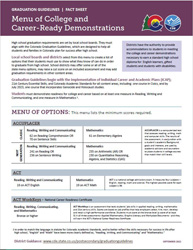You are here
Menu of Options
Menu of College and Career-Ready Demonstrations
High school graduation requirements are set by local school boards. They must align with the Colorado Graduation Guidelines, which are designed to help all students and families in Colorado plan for success after high school.
Local school boards and districts select from this menu to create a list of options their students must use to show what they know or can do in order to graduate from high school. School districts may offer some or all of the state menu options, may raise a cut score on an included assessment and may add graduation requirements in other content areas.
Graduation Guidelines begin with the implementation of Individual Career and Academic Plan (ICAP); 21st Century Essential Skills; and Colorado Academic Standards for all content areas, including one course in Civics and one course that incorporates Genocide and Holocaust studies.
Students must demonstrate readiness for college and career based on at least one measure in Reading, Writing and Communicating, and one measure in Mathematics.
Accommodation exceptions: Districts have the authority to provide accommodations to students in meeting the college and career demonstrations necessary to earn a standard high school diploma for: English learners, gifted students, and students with disabilities.
This menu lists the minimum scores required. (Last updated October 2024)
Click on the underlined word in each box to access resources, guidance, and promising practices.
CLASSIC ACCUPLACER
Reading, Writing and Communicating:
62 on Reading Comprehension or 70 on Sentence Skills
Mathematics:
61 on Elementary Algebra
NEXT GENERATION ACCUPLACER
Reading, Writing and Communicating:
241 on Reading or
236 on Writing
Mathematics:
255 on Arithmetic (AR) or
230 on Quantitative Reasoning, Algebra, and Statistics (QAS)
ACCUPLACER is a computerized test that assesses reading, writing, math and computer skills. The results of the assessment, in conjunction with a student’s academic background, goals and interests, are used by academic advisors and counselors to place students in a college courses that match their skill levels.
ACT
Reading, Writing and Communicating:
18 on ACT English
Mathematics:
19 on ACT Math
ACT is a national college admissions exam. It measures four subjects - English, reading, math and science. The highest possible score for each subject is 36.
ACT WorkKeys - National Career Readiness Certificate
Reading, Writing and Communicating:
Bronze or higher
Mathematics:
Bronze or higher
ACT WorkKeys is an assessment that tests students’ job skills in applied reading, writing, mathematics and 21st century skills. Scores are based on job profiles that help employers select, hire, train, develop and retain a high-performance workforce. Students must score at the bronze level (a score of at least 3) in all three assessments - Applied Mathematics, Graphic Literacy, and Workplace Documents - and they will earn the ACT’s National Career Readiness Certificate.
Advanced Placement (AP)
Reading, Writing and Communicating:
2
Mathematics:
2
AP exams test students’ ability to perform at a college level. Districts choose which AP exams will fulfill this menu option. Scores range from 1 to 5 (highest).
ASVAB
Reading, Writing and Communicating:
31 on the AFQT
Mathematics:
31 on the AFQT
The Armed Services Vocational Aptitude Battery (ASVAB) is a comprehensive test that helps determine students’ eligibility and suitability for careers in the military. Students who score at least 31 on the AFQT are eligible for service (along with other standards that include physical condition and personal conduct). Students who take the ASVAB are not required to enlist in the military.
Concurrent Enrollment
Reading, Writing and Communicating:
Passing grade per district and higher education policy
Mathematics:
Passing grade per district and higher education policy
Concurrent enrollment provides students the opportunity to enroll in postsecondary courses, simultaneously earning high school and college credit. School districts and institutions of higher education each determine passing grades for credit and concurrent enrollment. An eligible concurrent enrollment course is 1) the prerequisite directly prior to a credit-bearing course or 2) a credit-bearing course, and 3)governed by a district-level cooperative agreement of MOU. Districts choose which courses will fulfill this option.
District Capstone
Reading, Writing and Communicating:
Individualized
Mathematics:
Individualized
A capstone is the culminating exhibition of a student’s project or experience that demonstrates academic and intellectual learning. Capstone projects are district determined and often include a portfolio of a student’s best work.
Industry Certificate
Reading, Writing and Communicating:
Individualized
Mathematics:
Individualized
Industry certificates are credentials recognized by business and industry. They are are district determined, measure a student’s competency in an occupation, and they validate a knowledge base and skills that show mastery in a particular industry.
International Baccalaureate ® (IB)
Reading, Writing and Communicating:
4
Mathematics:
4
IB exams assess students enrolled in the official IB Diploma Programme. Districts choose which IB exams will fulfill this option. Scores range from 1 to 7 (highest).
SAT: Scores updated for new SAT (2016)
Reading, Writing and Communicating:
470
Mathematics:
480 *
The SAT is a college entrance exam. The SAT includes sections on reading, writing and math. The highest possible score for each section is 800.
*480: Beginning with Digital SAT, 2023-24, extending through 2025-26
*500: 2022 -2023 and prior to Digital SAT
Collaboratively-developed, standards-based performance assessment
Reading, Writing and Communicating:
State-wide scoring criteria
Mathematics:
State-wide scoring criteria
For this option, students use an authentic demonstration of academic knowledge and Essential Skills through the creation of a complex product or presentation.
Contact
Michelle Romero
Director
Phone: 303-877-4155



Connect With Us





